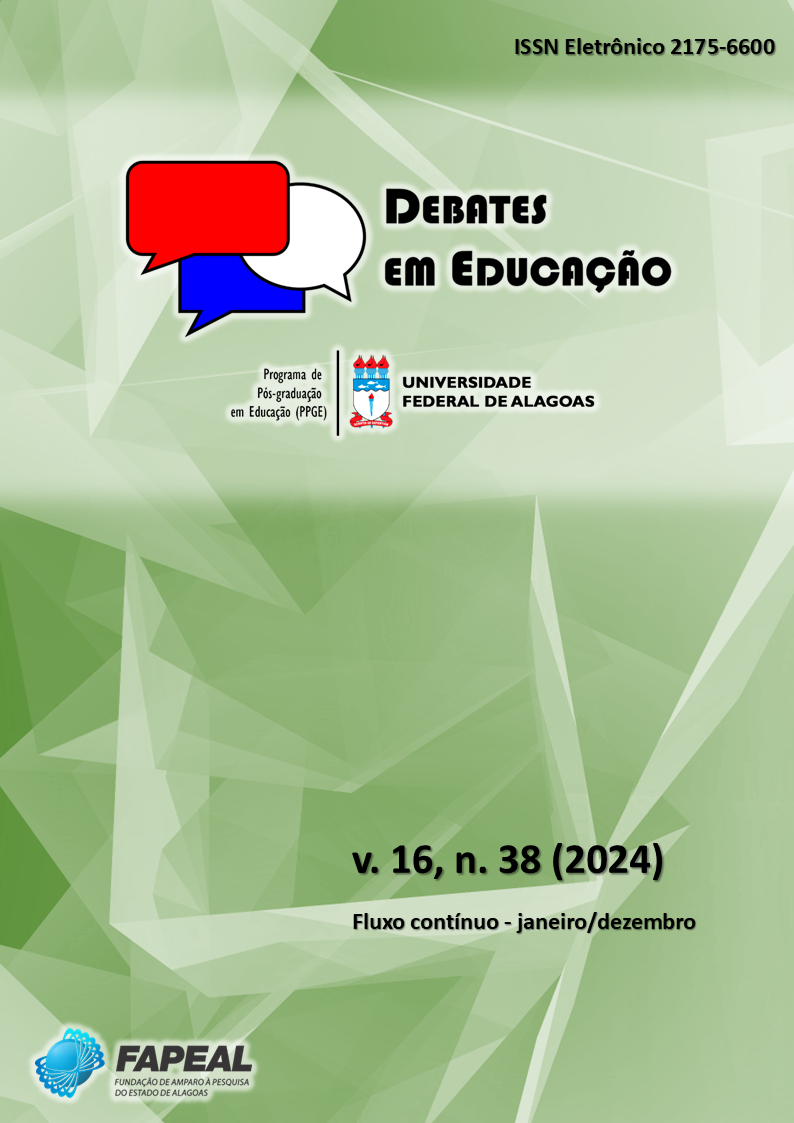Enactionism, ecology and a path to the emancipation and decolonization of school artistic practices
DOI:
https://doi.org/10.28998/2175-6600.2024v16n38pe18450Keywords:
Art and education, Creation of knowledge, Social emancipationAbstract
From the perspective that emancipation processes begin with the understanding that perceiving is acting, this text proposes to reflect on how artistic practices in schools on the periphery of capitalism can also constitute emancipatory action. This is done here in the form of an essay using a bibliographic review methodology and a phenomenological approach, which recalls situations experienced in the classroom and relates them to concepts from the bibliography studied. It starts from perspectives of the ecology of mind and the enactionist approach to cognition to describe relationships with decolonial and anti-Cartesian thought. The first section emphasizes and articulates concepts of perception, action and social emancipation, seeking to bring together epistemological aspects (such as the concepts of learning and perception) and political aspects (such as: domination and control). The second part hopes to locate in some artistic practices the emancipatory possibilities in the face of oppression typical of schools and education on the periphery of capitalism. Finally, a third stage thinks about the limits and scope of these practices, with a view to strengthening the processes of social emancipation in the context addressed.
Downloads
References
BATESON, G. Mind and Nature. Cresskill: Hampton Press Inc, 1979-2002.
CLARK, A. Being there: putting brain, body and world together again. Massachusetts: The MIT Press, 1997.
DEBORD, G. A sociedade do espetáculo. Rio de Janeiro: Contraponto, 2017.
FANON, F. Pele negra, máscaras brancas. Salvador: EdUFBA, 1952-2008.
GARDNER, H. A nova ciência da mente. São Paulo: EdUSP, 1996.
GIBSON, J. J. The ecological approach to visual perception. New York: Psychology Press, 2015.
GIBSON, E. J.; PICK, A. D. An ecological approach to perceptual learning and development. New York: Oxford University Press, 2000.
KILOMBA, G. Memórias da plantação: episódios de racismo cotidiano. Rio de Janeiro: Cobogó, 2008-2019.
MATURANA, H. Da biologia à psicologia. Porto Alegre: Artes Médicas, 1998.
MIGNOLO, W. The darker side of Renaissance. Michigan: The University of Michigan Press, 2018.
NOË, A. Perception in action. Massachusetts: The MIT Press, 2004.
NEWEN, A.; DE BRUIN, L.; GALLAGHER, S. 4E Cognition: historical roots, key concepts, and central issues. New York: Oxford University Press, 2018.
OLIVEIRA, A. L. C. G. Cismando com o dualismo cartesiano e seus desdobramentos em práticas e estruturas escolares contemporâneas nas margens do capitalismo. Educação e Filosofia, Uberlândia, v. 35, n. 75, p. 1321–1350, 2022. DOI: 10.14393/REVEDFIL.v35n75a2021-62855. Disponível em: https://seer.ufu.br/index.php/EducacaoFilosofia/article/view/62855. Acesso em: 28 out. 2024.
OLIVEIRA, A. L. C. G. Conhecimento como criação: subversão de tecnologia educacional na periferia do capitalismo. Revista Diálogo Educacional, [S. l.], v. 24, n. 80, 2024. DOI: 10.7213/1981-416X.24.080.AO10. Disponível em: https://periodicos.pucpr.br/dialogoeducacional/article/view/30845. Acesso em: 28 out. 2024.
OLIVEIRA, A. L. C. G. Práticas artísticas modernas e contemporâneas: aspectos estéticos, poéticos e éticos. In: SESC. Departamento Nacional. Educação em Rede – Com(A)rtes: diálogos entre arte, educação e cultura. Vol. 8. Rio de Janeiro: Sesc Departamento Nacional, 2021, p. 78-101.
RANCIÈRE, J. A partilha do sensível: estética e política. São Paulo: Editora 34, 2009.
RANCIÈRE, J. O espectador emancipado. São Paulo: Editora WMF Martins Fontes, 2012.
SPINOZA, B. Ética. Belo Horizonte: Autêntica Editora, 2009.
VARELA, F.; THOMPSON, E.; ROSCH, E. A mente corpórea. Porto Alegre: Artmed, 2003.
Downloads
Published
How to Cite
Issue
Section
License
Copyright (c) 2024 Debates em Educação

This work is licensed under a Creative Commons Attribution-NonCommercial 4.0 International License.
Neste tipo de licença é permitido Compartilhar (copiar e redistribuir o material em qualquer suporte ou formato) e Adaptar (remixar, transformar, e criar a partir do material). Deverá ser dado o crédito apropriado , prover um link para a licença e indicar se mudanças foram feitas . O conteúdo não pdoerá ser utilizado para fins comerciais .
Atribuição-NãoComercial 4.0 Internacional Creative Commons Attribution 4.0 (CC BY-NC 4.0).

